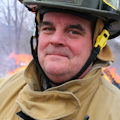Dub Gillum, a 21-year trooper with the Texas Highway Patrol, said police, fire and EMS responders are supposed to be good drivers. Gillum was speaking to an audience of emergency responders in Dallas, Texas on Thursday at the co-located EMS Expo, Firehouse Central and Enforcement Expo.
"We're all good drivers, right?" Gillum said. "So why don't we keep both hands on the wheel and both eyes on the road and just drive?" Gillum said as responders, "Our first line of defense is education. "As first responders we have to react," he added. "With education we can be proactive."
When it comes to the public and distracted driving, Gillum said that in his more than 20 years as a trooper, he's seen it all, including a woman who was changing from her nightclothes on her way to work.
"It was about 5:30 a.m. and I had a car all over the road and I thought I had a D.U.I.," Gillum said. "I pulled it over and noticed the car driver was wiggling all over the place inside. As I walked up she said; 'Just a minute.' She was pulling up her pantyhose. On the seat next to her, was her slippers, her nightshirt, curlers, everything."
Efforts to have people buckle up have been 95 percent effective because of aggressive advertising including the campaigns of "Click it or Ticket," and "Buckle Up or Pay Up."
"Distracted driving is the number one cause of all crashes," Gillum said, adding that crashes kill 42,000 "friends and family members" annually. "It's interesting that when you say 42,000 people, it's like ehhh... big deal, but when you say friends and family members, it suddenly means something," he said.
On Sept. 11, 2001, nearly 3,000 people died in the terrorists' attacks, Gillum reminded the audience. "And what did we do? We declared war," Gillum said. "We've spent billions since then on making us safe."
He said there seems to be a disconnect when it comes to spending money and allocating resources to prevent distracted driving which claims more than 10 times the lives the 9/11 attacks did.
"We need to start getting serious about preventing distracted driving," he said, noting that includes texting, cell phone operations, GPS navigation, and even music radios and CDs. "Anything that takes your mind off of driving is a distraction," he said.
Responders are under the false impression that they must hurry to the scene to "save precious seconds," he said. "Is your life worth more than a few seconds?" Gillum asked. "Of course it is. It's just not worth it. Slow down a little and get there safely."
The faster one goes, the longer it takes to stop, he reminded people, and used graphic accident reenactments that are played as public service announcements in the United Kingdom to prove his point.
The United States needs to be as aggressive with its public service announcements (PSAs) and show the devastating effects of distracted driving as other countries do now, he said, noting that most of the government sponsored PSAs he showed during the class would never be shown in the United States. They illustrated bloodied and apparently dead teenagers killed in wrecks, and pedestrians struck, thrown and killed by people using cell phones and texting.
When it comes to police cruisers, there are more distractions than ever before inside. "Cruisers today are like the Knight Rider car, KITT," Gillum said, recollecting a 1980s television show featuring a high-tech talking car used by David Hasselhoff for crime fighting.
"Gadgets in emergency vehicles are now seen as a peril," Gillum said, noting that some might dispute that, saying the technology is useful in police work and emergency responses for ambulances and fire apparatus. Gillum, however, is of the mind that computers in the cruiser are at least as dangerous.
"What are we doing typing on the computer in the cruiser?" Gillum said. "I'm a police officer, not a police communications officer. We pay good money for those people. We need to keep focused on what we do, not typing on a computer."
Gillum said he's heard a recent trend that suggests people are taking computers out of their cruisers for the same reason that people are being discouraged from texting and using the cell phone -- they are distractions.
"We should know better," he said. "Responders are held to a higher standard. We have to be good drivers."
Gillum is convinced that just as technology has made distracted driving worse, it will also make it better with things like voice control applications and automatic license plate scanning, which has already been introduced in the market.
"Cruisers, and ambulances and fire trucks are being built with more gadgets today than you can shake a stick at," he said. Not all of its bad, he added, but all of it needs to be put in its place and used only when safe and appropriate.
"There's a saying in the UK and that is 'Just Drive,'" Gillum said. "We need to remember that here and remember that safe driving is a full-time job... Let's bring both hands back to the wheel and both eyes back on the road and just drive."
About the Author

Ed Ballam
Ed Ballam served as associate editor for Firehouse. He is the assistant chief of the Haverhill Corner, N.H. Fire Department, and a National Registered EMT. He is also a Deputy Forest Fire Warden for the New Hampshire Division of Forests and Lands. Professionally, he's been a journalist for over 35 years working for a variety of publications, including employment as managing editor of a national fire service trade journal for more than a decade.